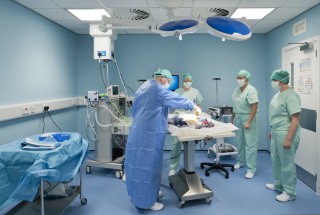There are less than three months to go until Europe’s biggest emergency and critical care conference. The annual event, held at the Majestic Hotel in Harrogate, North Yorkshire, has been a mainstay of the veterinary CPD calendar for 14 years.
Several of the speakers are clinical experts at Vets Now’s emergency and specialty hospitals, including renowned soft tissue specialist Professor John Williams, who is based in our state-of-the-art Manchester facility.
Here, in the first of a series of interviews with some of the Congress speakers, John sheds some light on his role at Vets Now and gives us a sneak preview of his eagerly anticipated Congress presentations.
How did you end up at Vets Now?
I qualified as a vet in 1984 and spent six years in general practice. I then took up a residency at the University of Cambridge for four years. My next move was to the University of Liverpool where I ended up as head of small animal studies. I left academia in 1999 to set up a referral practice in Cheshire and I worked there for 12 years before moving to another referral practice in the same area. I joined Vets Now last year.
What is your role?
I’m the national surgical lead. I saw this opportunity as a fantastic challenge and I was particularly excited about working with an already well-established team in Glasgow and being part of a new referral centre in Manchester. My working week is split between the hospital in Manchester and performing my national surgical lead duties. This role regularly takes me to Glasgow and Dunfermline, the home of the Vets Now support office, where I work with the rest of team developing strategies for Vets Now surgically.
Tell me more about your main clinical interests?
My main clinical interests are in reconstructive surgery and trauma and this has led me into the interesting field of damage control surgery. This was first pioneered in war zones where surgeons on the front line realised that operating on patients immediately didn’t always guarantee the best outcome. Damage control is about considering doing a minor procedure to stop something going badly wrong and then doing the main surgery a few days later when the patient is more stable and better able to cope.
Your first topic at Congress is trauma management. What’s new in that field?
I’ll be looking at what evidence we have for surgery for trauma management. My research into this field has shown there’s currently very little evidence to tell us when we should operate on patients. It’s the same for humans and it brings us back to the issue of damage control surgery. I’ll be looking at scenarios around delaying surgery until the patient’s in a better state and, more broadly, why we operate when we operate.
Can you give me a sneak preview of your lecture on body cavity penetrating wound management?
This will look at what we should be worried about when a patient has a penetrating wound either from a stick or another sharp obect, such as teeth of another dog which have perhaps entered the chest or the abdomen. Often, the damage we see on the skin and the superficial layers is often the tip of the iceberg and the real damage is internal. What we need to do is have strategies to work out the extent of the internal damage so we can take steps on how to manage that.
You are also involved in a forum with Amanda Boag, Karen Humm and Louise O’Dwyer. How will the audience benefit?
These forums are great because they bring together people who are experts in their fields. One of the main reasons I enjoy the discussions is there’s often a slight difference in opinion and this can demonstrate that there’s not always a right way or a wrong way to carry out certain procedures. The audience gets a lot out of that because they can see we’re having a proper clinical discussion about cases and not simply pontificating.
Would you recommend Congress to others?
Absolutely. I went last year and had a great time, not only from the clinical side but also the social. For me, it’s a great opportunity for vets and vet nurses interested in emergency and critical care to get great science and spend time together socially.
Several staff from Manchester are presenting at Congress. What does this say about the level of expertise in the hospital?
It demonstrates that the level and standard of care we can offer in Manchester is excellent. We have a number of boarded specialists and we are also very lucky to have Louise O’Dwyer who is one of the foremost nurses in trauma in the UK.
What makes the hospital in Manchester a special place to work?
Our hospital is vibrant. It’s based in a new building with state-of-the-art facilities and hi-tech equipment. We also have an excellent team of vets, vet nurses and support staff who are a great bunch to work with. It’s this team that makes Manchester tick. We all work really well together and get on well with each other.
Where do you see the hospital in five years’ time?
I’d like to see it become one of the premier referral and critical care centres in the UK. We certainly have the right team in place to achieve that.




